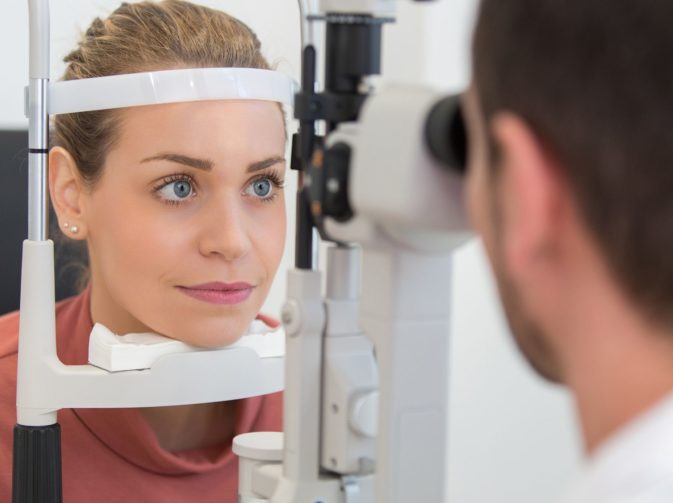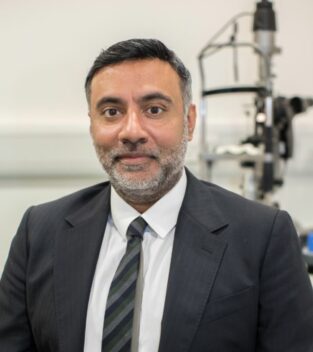

Ophthalmology
We’re at the forefront of advanced eye care. Allowing you to see the world so much clearer.
Our experienced consultant ophthalmic surgeons provide dedicated care in all aspects of ophthalmology tailored to individual needs in fully equipped examination rooms.
The team of ophthalmic surgeons at the Fitzrovia Hospital provide a complete range of ophthalmic services including cataract removal, glaucoma surgery, blepharoplasty and asian eye lid surgery.
Ophthalmology at the Fitzrovia Hospital
Specialist areas:
- Lens replacement
- Cataracts
- Glaucoma
- New Lenses for macular degeneration
- Canthopexy / Asian eye lid surgery
- Eye Bag Removal / Blepharoplasty
Lens Replacement
If you long to be free from wearing glasses or contact lenses then lens replacement surgery may be the answer. At Fitzrovia Hospital we have access to a selection of the most advanced lenses.
Your Consultant Ophthalmologist will advise you on which are best, taking into account a variety of factors. Following the procedure you will benefit from high definition, spectacle free vision. One of the main benefits of lens replacement surgery is that it can remove cataracts and replace them with clear lenses. But to gain an advantage from the procedure you don’t have to have cataracts. Lens replacement can be used to treat a wide range of ocular problems.
Canthopexy
Canthopexy, also referred to as Asian eye lid surgery is a type of Blepharoplasty. Asian eye lid surgery enables a fold to be created on the upper eyelid. This achieves a rounder and larger appearance to the eyes. This outpatient procedure is fairly simple and involves removing a small amount of excess skin, fat pads and skin tissue.
This is a reconstructive surgical procedure which is used to correct drooping or sagging eyes, by tightening the muscles or ligaments that give support to the outer corners of the eyelid.
Canthoplasty essentially alters the shape of the eye. Canthopexy, on the other hand, is a less invasive surgery that is often confused with canthoplasty, but it does not change the shape of the eye.
Eye Bag Removal / Brow Lift
Inevitably skin loses elasticity as we age. This is often most noticeable around the sensitive skin of the eyes.
Eye-bags can appear and the eye area may become puffy and wrinkled, giving the eyes a tired appearance. In the upper eyelid, excess skin produces a hooded effect, this can also obscure vision, Blepharoplasty is usually straightforward and can be performed on the upper eyelids, lower eyelids, or both, in order to rejuvenate the appearance of the area around the eyes.
The surgeon will remove any excess skin and fatty tissue from around the eyes and stretch the skin to smooth out any lines and wrinkles and reduce the “hooded” effect above the eyes before stitching the skin back into place. This procedure is often performed alone but many people also choose to combine it with a face lift or brow lift.
Cataracts
When the eye’s natural lens becomes cloudy and difficult to see through, this is known as a cataract. This can happen due to one of several reasons; age, genetics, diabetes or even trauma.
The procedure to correct cataracts involves the old clouded lens being surgically removed and then replaced by a new artificial lens. Cataract surgery is highly effective, relatively quick and very safe. Cataract surgery is a procedure to remove the lens of your eye and, in most cases, replace it with an artificial lens. Normally, the lens of your eye is clear. A cataract causes the lens to become cloudy, which eventually affects your vision.
Cataract surgery is performed by an eye doctor (ophthalmologist) on an outpatient basis, which means you don't have to stay in the hospital after the surgery. Cataract surgery is highly effective, relatively quick and very safe.
Glaucoma
2% of the UK population have Glaucoma. Glaucoma is dangerous as it is an eye disease which can go undetected right up to the point at which your eyes have suffered permanent damage. This is why it is vital to visit an Ophthalmologist for regular eye assessments.
Most cases of Glaucoma is caused by too much pressure within the eye which results in the optical nerve being squeezed. Although, pressure is not always a factor.Innovative Glaucoma detection and treatment is available at Fitzrovia Hospital utilising the latest technology.
Age-related Macular Degeneration
AMD eventually leads to loss of sight, and is the most common cause of blindness in the developed world, with between 4-6 million sufferers in the UK and 560 million worldwide.
Advanced stages of AMD can result in severe loss of sight in the central part of vision. This is often referred to as a central vision “blind spot.” This blind spot is different than the visual disturbances experienced with cataracts (clouding of the eye’s lens) and is not correctable by cataract surgery or spectacles. Side vision, or peripheral vision, is not affected by AMD, but is too low resolution to make up for lost central vision. Macular Degeneration can often be effectively treated through ophthalmic surgery. The team of Consultant Ophthalmologists at Fitzrovia will advise you on the best procedures and lenses to help restore your sight.
Meet the team of ophthalmic surgeons at the Fitzrovia Hospital
GET IN TOUCH
Contact Us
Give us a call or drop by, we endeavour to answer all enquiries within 24 hours.
The Fitzrovia Hospital
13-14 Fitzroy Square
London
W1T 6AH
Telephone: 0207 034 3300
Email: enquiries@fitzroviahospital.com or reception@fitzroviahospital.com
Opening hours: Monday - Friday 8am to 8pm
Car parking facilities in Fitzrovia square are restricted. We advise that patients are dropped off immediately outside the main entrance to the hospital. Car parking facilities can be found several minutes away adjacent to the Holiday Inn where there is a public car park. Address: Carburton St, London W1W 5EE. A map can be found here.









